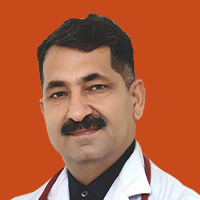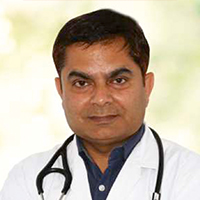

Successful Treatments
Clinics
Doctors
What is Atherosclerosis?
Atherosclerosis is a condition where your arteries get blocked by plaque - a sticky mixture in your blood, made of fat, calcium, cholesterol and other substances. This build up gradually hardens over time and narrows the arteries, which are the blood vessels that carry oxygenated blood out of your heart to other areas of your body.
Blood can not flow through clogged arteries. In this condition, your arteries get so narrow that fewer blood reaches your organs and tissues, and that can cause serious health problems.
The real danger is when a piece of the plaque breaks open. This can form a blood clot on the surface and completely block the blood flow. Depending on the blocked artery, this particular blockage may cause serious issues, and even lead to life-threatening conditions like strokes or heart attacks.
Understanding the causes of Atherosclerosis and taking steps to manage it may prevent these severe complications. Making lifestyle modifications like eating healthy, regularly working out and avoiding smoking can also help control and prevent Atherosclerosis.
Common Causes of Atherosclerosis
Atherosclerosis doesn't happen overnight; it develops over the years and is impacted by several factors. Understanding what triggers the buildup of plaque in your arteries may help you prevent the same from turning into a life-threatening condition.
The most common causes linked to Atherosclerosis are:
High Cholesterol: Too much cholesterol in the blood can create plaque. LDL cholesterol (bad cholesterol) is especially problematic as it sticks to the walls of your arteries.
High Blood Pressure: High blood pressure can damage the inner walls of the arteries. Eventually, this damage can provide a foothold for plaque to accumulate.
Smoking: Tobacco smoke contains toxins that irritate and damage the linings of the artery walls. This speeds up plaque accumulation and increases the risk of clots.
Diabetes: High blood sugar is associated with a higher rate of Atherosclerosis. Diabetes makes it harder to use insulin and control cholesterol, which can lead to faster plaque buildup.
Unhealthy Diet: Diets containing saturated fats, trans fats and processed sugar may raise cholesterol levels and increase arterial plaque formation.
Lack of Exercise: Regular physical exercise reduces cholesterol, blood pressure and helps maintain a healthy weight, lessening the risk of Atherosclerosis.
Obesity: Carrying additional weight places a strain on your heart and also raises your cholesterol and blood pressure levels, all of which may result in plaque accumulation.
Signs and Symptoms of Atherosclerosis
Atherosclerosis is sometimes called a silent killer because it may progress without showing any symptoms or signs until it narrows or blocks an artery entirely. Knowing the symptoms of Atherosclerosis might help with prompt detection and treatment, to prevent serious complications like strokes or heart attacks.
The most noticeable signs and symptoms of Atherosclerosis are:
Symptoms
Chest pain or angina
You may experience pressure or a tightness in your chest during physical work or from stress. This happens when the coronary arteries that supply blood to your heart are affected.
Shortness of breath
If your heart can not pump enough blood to meet your body’s requirements, you might develop shortness of breath or serious fatigue with exertion.
Leg or arm pain
When the arteries that carry blood to your limbs are blocked, you might experience discomfort or cramping in your muscles when you move. This often eases with rest.
Numbness or weakness
Blocked arteries can keep enough blood from getting to your limbs or other areas of your body, making you weak or numb on one side of your body.
Confusion
Your brain may experience reduced blood flow, causing confusion or memory problems.
Difficulty talking or slurred speech
A blocked artery to the brain can also affect speech.
Headache, dizziness or trouble walking
These could be symptoms of a stroke, indicating that blood flow to part of your brain has been cut off.
Coldness in a specific area of your arm or leg
Decreased blood flow may cause a temperature difference in some areas.
Erectile dysfunction
In males, Atherosclerosis could hinder blood flow to the pelvis, affecting sexual performance.
Do you have any of the following symptoms?
- Chest pain or discomfort
- Persistent shortness of breath
- Pain or cramping in your legs or arms
- Numbness or weakness in your limbs
- Confusion or trouble concentrating
- Sudden severe headache, dizziness, or difficulty with balance
- Coldness in a specific part of your arm or leg
- Experiencing erectile dysfunction
Jiva Ayunique™ Treatment Philosophy - A Holistic Approach to Atherosclerosis
Jiva Ayurveda offers holistic Ayurvedic treatment of Atherosclerosis using evidence-based Ayurveda. The treatment plans are customised to target the very root causes of the disease, and instead of just treating symptoms, they focus on holistic healing, balance and stability in totality.
Core Principles of the Jiva Ayunique™ Treatment Philosophy
HACCP certified Ayurvedic medicines: Scientifically-formulated mixtures that help restore the body’s balance and promote emotional stability.
Yoga, Meditation & Mindfulness: These calming practices promote mental health and overall wellbeing.
Ayurvedic Treatments: Therapies like Panchakarma and other therapeutic massages cleanse the body and establish emotional equilibrium.
Dietary & Lifestyle Modifications: Customised advice on diet changes and lifestyle adjustments for optimal health.
Ayurvedic Medicines for Atherosclerosis
Ayurveda offers natural cures which have been used for centuries to preserve heart health and keep plaque from developing in the arteries. Such traditional medicines work on balancing the doshas of the body and cleansing the blood to prevent the risk of Atherosclerosis.
Listed here are the best Ayurvedic herbs for Atherosclerosis management & treatment :
Arjuna (Terminalia arjuna): Arjuna is a heart-protective herb. Arjuna bark strengthens the heart muscles and lowers cholesterol and blood pressure, preventing plaque accumulation.
Guggul (Commiphora mukul): Guggul resin is a lipid lowering agent. It helps reduce bad cholesterol (LDL) and triglycerides, and thus lowers the risk of Atherosclerosis-related heart diseases.
Garlic (Allium sativum): Among its many health advantages, garlic reduces blood pressure and cholesterol, which is essential for preventing Atherosclerosis.
Turmeric (Curcuma longa): The curcumin in turmeric possesses anti-inflammatory and antioxidant properties which prevent artery damage that causes plaque accumulation.
Ashwagandha (Withania somnifera): This adaptogenic herb relieves stress and inflammation, which cause chronic conditions such as Atherosclerosis.
Pushkarmool (Inula racemosa): Found to alleviate symptoms of chest pain and breathing troubles, Pushkarmool is used for its beneficial effects on cardiovascular health, particularly in lowering LDL cholesterol levels.
FAQs
In Ayurveda, Atherosclerosis is considered an imbalance of the doshas (Kapha & Pitta) resulting in accumulation of toxin in the arteries.
Yes, Ayurveda can prevent Atherosclerosis through a diet that balances the doshas and with cleansing herbs that detox the blood and strengthen the heart.
Ayurveda suggests a low fat/high fibre diet combined with herbs like ginger and turmeric to curb plaque buildup.
Ayurvedic recommendations for preventing and controlling Atherosclerosis include regular exercise, stress management through meditation and yoga and avoiding smoking.
Herbs like Guggul, Arjuna and Garlic are suggested for their cholesterol-lowering and artery-protecting properties.
Physical examination, patient history and pulse diagnosis are used to assess dosha imbalances in the body as per Ayurveda.
Stress is a major cause for Atherosclerosis. Ayurveda treats stress with herbal treatments, combined with relaxing techniques like yoga and meditation.
For managing Atherosclerosis, therapies such as Panchakarma and Abhyanga (oil massage) for detoxification are used.
The results of Ayurvedic therapy might take a few weeks to months to show improvements, based on the person's condition and lifestyle.
Ayurvedic treatment assists with managing the symptoms of Atherosclerosis and delaying the disease progression through holistic care.
Top Ayurveda Doctors
Our Happy Patients
Home Remedies
- पेट में गैस, जलन या संक्रमण? इन घरेलू उपायों से पाएं राहत
- पेट में गैस, अपच और फुलाव का आयुर्वेदिक इलाज - मुफ़्त परामर्श
- एनल फिशर से परेशान हैं? ये आयुर्वेदिक नुस्खे देंगे राहत और आराम
- कब्ज़ का आयुर्वेदिक इलाज - मुफ़्त परामर्श
- एसिड रिफ्लक्स का घरेलू इलाज - मुफ़्त आयुर्वेदिक परामर्श
- Food Poisoning का आयुर्वेदिक इलाज - मुफ़्त परामर्श
- क्या बार-बार उल्टी हो रही है? इन घरेलू उपायों से पाएं तुरंत आराम
- क्या आप जानते हैं? इन नुस्खों से पेट दर्द जड़ से खत्म होता है!
- बार-बार एसिडिटी? ये देसी नुस्खे तुरंत देंगे आराम!
- दवा की ज़रूरत नहीं! लूज़ मोशन का रामबाण इलाज घर पर ही
- Home Remedies for Vomiting
- Home Remedies for Piles
- Home Remedies for Food Poisoning
- Home Remedies for Stomach Infection
- Home Remedies for Bloating
- Home Remedies for Anal Fissure
- Home Remedies for Constipation
- Home Remedies for Acid Reflux
- Home Remedies for Acidity
- Home Remedies for Stomach Pain
Related Disease
- Ayurvedic Treatment for Acid Reflux
- Ayurvedic Treatment for Anemia
- Ayurvedic Treatment For Anorexia
- Ayurvedic Treatment for Chronic Fatigue Syndrome
- Ayurvedic Treatment For Gastritis
- Ayurvedic Treatment For Colitis
- Ayurvedic Treatment For Crohn’s Disease
- Ayurvedic Treatment for Weakness and Fatigue
- Ayurvedic Treatment For Flatulence
- Ayurvedic Treatment for Gallstones
- Ayurvedic Treatment for Jaundice
- Ayurvedic Treatment for Liver Cirrhosis
- Ayurvedic Treatment for Sickle Cell Anaemia
- Ayurvedic Treatment For Piles And Fissure
- Ayurvedic Treatment for Irritable Bowel Syndrome (IBS)
- Ayurvedic Treatment For Hyperacidity
- Ayurvedic Treatment for Constipation
- Ayurvedic treatment for Coeliac Disease
- Ayurvedic Treatment for Peptic Ulcer
- Ayurvedic Treatment for Tapeworm
- Ayurvedic Treatment for Typhoid
- Ayurvedic Treatment for Diarrhea
- Ayurvedic Treatment for Diverticulitis
- Ayurvedic Treatment for Pinworms
- Ayurvedic Treatment for Cholera
- Ayurvedic Treatment for Emphysema
- Ayurvedic Treatment for Food Poisoning
- Ayurvedic Treatment for Atherosclerosis
- Ayurvedic Treatment for Thalassemia
- Ayurvedic Treatment for High Triglycerides
- Get Ayurvedic Treatment for Gastroenteritis
Latest Blogs
- क्या वैरिकोज़ वेन्स और DVT एक-दूसरे से जुड़े हैं? आयुर्वेद बताता है असली फर्क
- क्या त्वचा पर कुछ हिस्सों का अचानक रंग हल्का होने लगना Hypopigmentation है या Vitiligo? आयुर्वेदिक भेद समझें
- क्या धब्बों के आसपास खुजली या हल्की जलन Vitiligo flare का संकेत है? आयुर्वेदिक दृष्टि से समझें
- क्या रसायनिक उत्पाद, रंग-बिरंगे क्रीम या फ्रेगरेंस त्वचा पर दाग बढ़ा सकते हैं? Vitiligo में त्वचा-संवेदनशीलता आयुर्वेद से जानें
- क्या परिवार में पहले से Vitiligo होने पर बच्चों में इसका खतरा बढ़ जाता है? आयुर्वेदिक कारण समझें
- क्या तनाव बढ़ते ही सफ़ेद दाग फैलने लगते हैं? Vitiligo में मन-त्वचा संबंध आयुर्वेद की नज़र से जानें
- क्या बार-बार पेट संबंधी समस्याएँ—गैस, अपच, कब्ज़—Vitiligo को ट्रिगर करती हैं? आयुर्वेदिक व्याख्या देखें
- क्या धूप में जाने पर सफ़ेद दाग और ज़्यादा साफ़ दिखने लगते हैं? Vitiligo को आयुर्वेद की नज़र से जानें
- क्या त्वचा पर छोटे-छोटे सफ़ेद धब्बे उभरना Vitiligo का शुरुआती संकेत है? आयुर्वेदिक दृष्टि से समझें
- क्या सोरायसिस में त्वचा के साथ-साथ जोड़ों में दर्द (Psoriatic Arthritis) भी शुरू हो सकता है? आयुर्वेदिक दृष्टि से संकेत देखें
- क्या बार-बार स्टेरॉइड क्रीम लगाए बिना राहत नहीं मिलती? Psoriasis में मूल कारण कैसे समझता है आयुर्वेद—जानें
- क्या गर्मी और मसालेदार भोजन आपके Psoriasis को तुरंत flare-up करते हैं? आयुर्वेदिक कारण जानें
- क्या बार-बार त्वचा को मॉइस्चराइज़ करने पर भी सूखापन और जलन कम नहीं होती? Psoriasis को आयुर्वेद की नज़र से समझें
- क्या घुटनों, कोहनियों और पीठ पर मोटे patches बनना Psoriasis का विशिष्ट लक्षण है? आयुर्वेदिक व्याख्या जानें
- क्या बार-बार एलर्जी जैसी खुजली और जलन Psoriasis की ओर इशारा कर सकती है? आयुर्वेदिक दृष्टिकोण से समझें
- क्या सिर की त्वचा पर लगातार पपड़ी गिरना Dandruff नहीं—Scalp Psoriasis का लक्षण हो सकता है? आयुर्वेदिक संकेत देखें
- क्या तनाव बढ़ते ही त्वचा पर अचानक flare-up होना Psoriasis का क्लासिक पैटर्न है? आयुर्वेदिक कारण समझें
- क्या ठंड बढ़ते ही त्वचा फटना, लाल धब्बे और खुजली Psoriasis को ट्रिगर करते हैं? आयुर्वेद की नज़र से जानें
- क्या त्वचा पर मोटी, सफ़ेद पपड़ी बनना Psoriasis का शुरुआती संकेत है? आयुर्वेदिक दृष्टि से समझें
- क्या सिर्फ फिज़्योथेरपी से फ्रोज़न शोल्डर ठीक हो सकता है? आयुर्वेद बताता है किस चरण में क्या असरदार है
Ayurvedic Doctor In Top Cities
- Ayurvedic Doctors in Bangalore
- Ayurvedic Doctors in Pune
- Ayurvedic Doctors in Delhi
- Ayurvedic Doctors in Hyderabad
- Ayurvedic Doctors in Indore
- Ayurvedic Doctors in Mumbai
- Ayurvedic Doctors in Lucknow
- Ayurvedic Doctors in Kolkata
- Ayurvedic Doctors in Patna
- Ayurvedic Doctors in Vadodara
- Ayurvedic Doctors in Ahmedabad
- Ayurvedic Doctors in Chandigarh
- Ayurvedic Doctors in Gurugaon
- Ayurvedic Doctors in Jaipur
- Ayurvedic Doctors in Kanpur
- Ayurvedic Doctors in Noida
- Ayurvedic Doctors in Ranchi
- Ayurvedic Doctors in Bhopal
- Ayurvedic Doctors in Ludhiana
- Ayurvedic Doctors in Dehradun









































